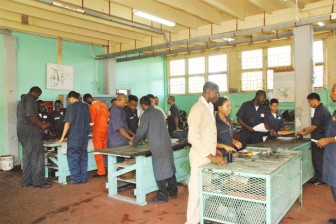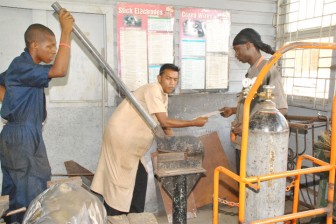The Government Technical Institute (GTI) is currently is helping to meet the skills needs of the local business community and is even responding to requests from enterprises in the Caribbean to provide trained graduates to meet some of the needs of industry in the region, Principal Carl Benn told Stabroek Business in an interview earlier this week.
Benn said that while the GTI was once dismissed as an option for post-secondary underachievers, the institution now offers a broad-based curriculum tailored to help meet the needs of both private and public sector institutions. In the Caribbean, the skills of GTI graduates in the construction field are both recognized and sought after in countries such as Trinidad and Tobago, St Lucia and Barbados. “A few of our students have even done well in the UK,” Benn said.

While GTI is a state institution supported by a government subvention, Benn said the private sector has looked to the institution to provide it with the skills it requires in several sectors. He said the relationship works to the mutual advantage of the GTI and the private sector, since business houses continued to provide various forms of material and other support for the institution. The current Board of Directors of the GTI includes private sector representatives.
Benn told Stabroek Business that GTI had been able to help meet the some of the skills needs of the private sector because of the practical orientation of the curriculum. He explained that while, as an institution of learning, GTI was oriented towards certification, there was also a need to focus on the importance of preparing young men and women for the world of work in industry, commerce and other areas.
The private sector has shown an interest in a number of courses being offered by the GTI including those in its Building and Mechanical Engineer-ing Departments. GTI offers courses in a number of building-related areas including bricklaying, concreting, carpentry and joinery and Benn said GTI was satisfied with the quality of graduates it was sending to the private sector. Additionally, the GTI principal told Stabroek Business he believed that graduates of the institution would add value to the local construction sector as the national housing programme continues to unfold. Graduates of the institute’s Mechanical Engineering Department are also being recruited by the private sector. Benn said the private sector was also providing support for the institution through limited numbers of practical work-study assignments for students.


While the GTI functions as a training institution, Benn says the orientation of the curriculum allows for the institution to secure limited contracts in the building sector, the biggest of those being a contract with the Ministry of Education to provide furniture for state schools.
Meanwhile, Benn disclosed that the GTI is one of a number of local training institutions that will be working with the Council for Technical and Vocational Education and Training (CTVET) to boost technically skilled persons in the work force who have no formal qualifications. The initiative, Benn says, is designed to help uncertified persons meet the levels of occupational standards approved by the Caribbean Community (Caricom).




